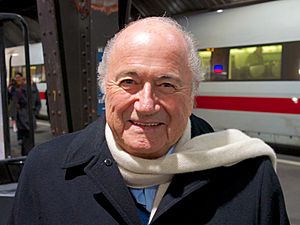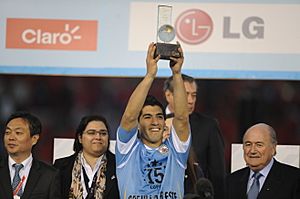Sepp Blatter facts for kids
Quick facts for kids
Sepp Blatter
|
|
|---|---|
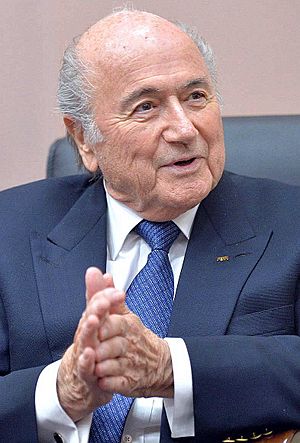
Blatter in 2015
|
|
| 8th President of FIFA | |
| In office 8 June 1998 – 21 December 2015 |
|
| Preceded by | João Havelange |
| Succeeded by | Issa Hayatou (acting) Gianni Infantino |
| Secretary General of FIFA | |
| In office June 1981 – 8 June 1998 |
|
| Preceded by | Helmut Käser |
| Succeeded by | Michel Zen-Ruffinen |
| Personal details | |
| Born |
Josef Blatter
10 March 1936 Visp, Valais, Switzerland |
| Spouses | Liliane Biner (divorced) Barbara Käser
(m. 1981; died 1991)Graziella Bianca
(m. 2002; div. 2004) |
| Domestic partners | Ilona Boguska (1995–2002) Linda Barras (2014–present) |
| Children | 1 |
| Residences | Zürich, Switzerland |
| Alma mater | University of Lausanne |
| Signature | |
Joseph Sepp Blatter (born Josef Blatter; 10 March 1936) is a Swiss former football leader. He was the eighth president of FIFA from 1998 to 2015. He has been suspended from taking part in FIFA activities since 2015 due to problems that came to light that year. This suspension will last until 2027.
Blatter worked in business, public relations, and sports. He became the general secretary of FIFA in 1981. He was then elected president on 8 June 1998, taking over from João Havelange. Havelange had led FIFA since 1974. Blatter was re-elected as president in 2002, 2007, 2011, and 2015.
Like Havelange, Blatter made FIFA stronger by including more African and Asian countries in world football. He did this by increasing the number of teams in different FIFA tournaments. This led to the choice of Qatar to host the 2022 World Cup. Qatar is a small country with a population of 3 million and not much football history.
Under Blatter's time as president, many committee members who voted on the 2018 and 2022 tournaments faced problems. Some were fined, suspended, or banned for life. Blatter himself was also involved in these investigations. Even with these issues, FIFA's income from the World Cup grew a lot during his time.
On 2 June 2015, Blatter announced he would step down as president. This was after the United States government started investigating several FIFA officials for bribery. He said he would stay until a new president was chosen at a special meeting. On 25 September 2015, Swiss officials began a criminal investigation into Blatter.
In October 2015, Blatter and other top FIFA officials were suspended. In December, the FIFA Ethics Committee removed Blatter from his position. They banned him from all FIFA activities for eight years. On 24 February 2016, a FIFA appeals committee reduced his ban to six years. On 24 March 2021, he received another six-year ban and a fine of CHF 1,000,000. This was after an investigation into large bonus payments. Issa Hayatou became the acting President of FIFA. Later, Gianni Infantino was elected as the 9th president of FIFA.
Contents
- Early Life and Career
- Blatter's Time at FIFA
- 1998 Presidential Election
- Comments on Women's Football
- 2006 FIFA World Cup Match
- Rules for Club Teams
- World Cup Host Choices
- Using Technology in Football
- 2011 FIFA Presidential Election
- Financial Management Issues
- 2018 and 2022 World Cup Host Choices
- 2013 FIFA Ethics Committee Investigation
- 2015 FIFA Presidential Election and Resignation
- After FIFA
- Awards and Recognition
- Personal Life
- See also
Early Life and Career
Blatter was born in Visp, a town in the Swiss canton of Valais. His birth name was Josef. He studied in Saint Maurice. In 1959, he earned a degree in business and economics from the University of Lausanne.
Blatter had a varied career before joining FIFA. He was the head of public relations for the tourism board of his home canton. He also served as the general secretary of the Swiss Ice Hockey Federation.
Blatter also worked as the Director of Sports Timing and Relations for Longines S.A. In this role, he helped organize the 1972 and 1976 Olympic Games.
Blatter's Time at FIFA
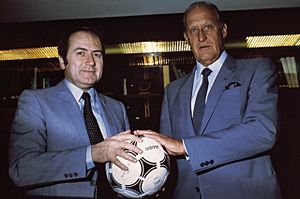
Blatter started working at FIFA in 1975. He first served as technical director from 1975 to 1981. Then, he became the general secretary from 1981 to 1998. He was elected FIFA president in 1998. He was re-elected in 2002 and again in 2007. In 2007, he was the only candidate.
Blatter's time at FIFA often involved disagreements and claims of problems. There were claims of financial issues and accepting gifts related to the choice of Qatar for the 2022 FIFA World Cup.
Blatter also faced criticism for some of his statements. For example, he suggested that on-field racism could be solved with a handshake. He also drew criticism at the 2014 FIFA World Cup seeding when he cut short a moment of silence for Nelson Mandela.
Blatter was sometimes booed by the public at football events. This happened at the World Cup in Seoul in 2002 and the Confederations Cup in Frankfurt in 2005. He was also heckled in his hometown of Visp in 2011. To avoid protests, no speeches were given at the 2014 FIFA World Cup.
1998 Presidential Election
Blatter's election as FIFA president in 1998 was against UEFA President Lennart Johansson. This election had many disagreements. There were rumors of financial issues and secret deals during his 2002 campaign. Some people even claimed that money was offered to vote for Blatter in 1998.
Comments on Women's Football
In 2004, Blatter made comments about how to make women's football more popular. His statements caused strong reactions and were seen as controversial.
2006 FIFA World Cup Match
During the 2006 FIFA World Cup, there was a controversial match between Portugal and the Netherlands. The referee, Valentin Ivanov, gave out many yellow and red cards. Blatter criticized the referee's performance. He later said he regretted his words. The referee was removed from officiating further matches.
Rules for Club Teams
In 2007 and 2008, Blatter was criticized for trying to change rules about foreign players in football clubs. He wanted to limit the number of foreign players to five. He believed this would help national teams by having more local players in their leagues.
Blatter often said that the English Premier League had too many foreign players, coaches, and owners. He used it as an example of a major problem in football.
World Cup Host Choices
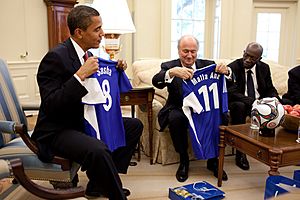
It was reported that Blatter had a secret agreement with UEFA head Michel Platini. This deal was to make sure Europe would host the 2018 World Cup. If non-European countries did not withdraw their bids for 2018, they would not get support from FIFA.
Eleven bids were submitted in March 2009 from 13 nations. Mexico and Indonesia later withdrew. Five bids were only for the 2022 World Cup: South Korea, Qatar, Japan, Australia, and the United States. Other countries bid for both 2018 and 2022. Because all 2018 bids were from European nations, and FIFA rules prevent countries from hosting two tournaments in a row, bids from England, Russia, Netherlands/Belgium, and Spain/Portugal were only for 2018.
Using Technology in Football
Blatter was criticized for not allowing goal-line technology or video replays in matches. This criticism grew after a controversial disallowed goal for England against Germany on 27 June 2010.
Two days later, Blatter said he was sorry for the "clear referee mistakes" in that match and another one. He apologized to the English and Mexican Football Associations. He admitted that the goal for England should have counted. He also said that FIFA would look into goal-line technology again. He promised changes to improve refereeing.
2011 FIFA Presidential Election
In 2011, Blatter ran for his fourth term as FIFA president. Another candidate, Mohammed bin Hammam from Qatar, withdrew from the race just before the vote. Bin Hammam had supported Blatter in earlier elections but had disagreements with him.
The FIFA ethics committee investigated claims against Bin Hammam. They announced that Blatter would not be investigated for knowing about any issues because there was not enough evidence.
Blatter criticized the International Olympic Committee (IOC). He said FIFA managed its money "like a housewife." This was after the IOC looked into claims against Issa Hayatou, president of the Confederation of African Football.
Since there were no other candidates, Blatter ran unopposed. He was re-elected for a fourth term with 186 out of 203 votes. During his campaign, Blatter had said he would not run for president again if re-elected in 2011. He faced criticism for not delaying the election, especially since other candidates had been suspended or withdrew.
Financial Management Issues
FIFA's secretary-general, Michel Zen-Ruffinen, who was Blatter's deputy, created a report. This report claimed there were financial problems within the organization. It said that FIFA's marketing partner, ISL, had lost up to 100 million US dollars under Blatter's leadership.
These claims were supported by Johansson. The report was given to Swiss authorities, but they found Blatter had not done anything wrong. FIFA had to pay all the costs. Blatter stopped an internal FIFA investigation because some members broke confidentiality rules. This led him to remove Zen-Ruffinen from his position before the 2002 FIFA World Cup.
In April 2012, the Council of Europe released a report. It suggested it would be "difficult to imagine" that Blatter did not know about large payments made to unnamed FIFA officials. These payments were from ISSM/ISL for World Cup television rights. ISL later went bankrupt in 2001.
2018 and 2022 World Cup Host Choices
There was disagreement in the British press when Russia was chosen to host the 2018 event. England received only two of the votes they expected. Blatter dismissed this, saying the English were "bad losers." The choice of Qatar for the 2022 games also caused disagreement. Blatter made a joke about how gay fans should behave in Qatar, which led to criticism from various groups.
2013 FIFA Ethics Committee Investigation
On 29 April 2013, FIFA's Ethics Committee finished its investigation. It looked into claims of improper payments to FIFA officials from ISL, which went bankrupt in 2001.
FIFA president Sepp Blatter was cleared of any wrongdoing. However, his predecessor, João Havelange, resigned as FIFA's honorary president. This was because Havelange and other former FIFA Executive Committee members were found to have accepted improper payments.
Blatter stated that he was pleased the report confirmed his actions were not against ethics rules. He added that FIFA now has ways to prevent such issues from happening again. He admitted that the situation had harmed FIFA's reputation.
2015 FIFA Presidential Election and Resignation
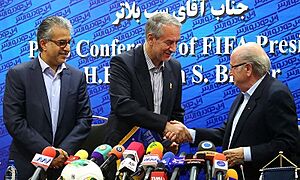
In 2015, Blatter ran for his fifth term as FIFA president. His opponent was Prince Ali bin Hussein.
The election took place in Zürich on 29 May 2015. Neither candidate received enough votes in the first round. Blatter had 133 votes, and Prince Ali had 73. A second round was supposed to happen, where a simple majority would win. However, Prince Ali withdrew before the second round, making Blatter the winner.
On 2 June 2015, Blatter suddenly announced he would resign as FIFA president. This was due to ongoing investigations.
He said that his leadership did not seem to have everyone's support. He announced a special meeting to elect his successor as soon as possible. Blatter stated he would stay in office until a new president was chosen. He also said he did not feel he had the support of the entire football world, including fans, players, and clubs.
Later, on 26 June, Blatter's comments caused confusion. He was quoted saying he had not resigned but had put his role in the hands of a special meeting. This seemed to go against his earlier statement. He also said he resigned to reduce pressure on FIFA and its employees. Reports suggested Blatter would step down at the special meeting, but the situation remained unclear.
On 25 September, Swiss investigators announced they were looking into Blatter. This was about payments made to UEFA president Michel Platini. Both Blatter and Platini denied any wrongdoing. However, major FIFA sponsors asked Blatter to resign for FIFA's benefit.
On 8 October 2015, Blatter was suspended from FIFA for 90 days. This was while investigations into the payments to Michel Platini continued. On 21 December, FIFA's ethics committee banned both Blatter and Platini from football for eight years. In February 2016, a FIFA appeals committee reduced the ban to six years.
On 22 December 2020, FIFA filed a complaint against Blatter. This was about his role in the FIFA Museum project.
On 24 March 2021, he received another six-year ban and a fine of CHF 1,000,000. This was after an investigation into large bonus payments.
On 2 November 2021, Swiss authorities formally charged Blatter with fraud and falsifying documents. This was related to the payments to Platini. Blatter and Platini were cleared of these charges eight months later. Even though prosecutors appealed, Blatter and Platini were found not guilty a second time in March 2025.
After FIFA
Since leaving FIFA, Blatter has criticized football's current leaders. He has specifically spoken against FIFA president Gianni Infantino and UEFA president Aleksander Čeferin. Blatter noted that when he started at FIFA, it was not as powerful as it is today. He admitted he played a big part in making football more commercial.
Blatter has said that choosing Qatar to host the 2022 FIFA World Cup was a mistake. He has also criticized the growth of tournaments like the FIFA World Cup and UEFA Champions League. He warned that too many games, rising costs, and fan violence could make people lose interest in football.
Blatter also criticized the choice of six countries on three continents to host the 2030 FIFA World Cup. He said the tournament would lose its identity. He also criticized the 2034 FIFA World Cup in Saudi Arabia. He stated it goes against FIFA's values of human rights and democracy. He also suggested the bidding process for 2030 and 2034 was set up to favor Saudi Arabia.
Awards and Recognition
Blatter has received many awards, medals, and honorary degrees. He has also been given honorary citizenships from countries, sports groups, universities, and cities.
His honorary degree from De Montfort University was taken away in October 2015. This was because it had been given to him for his ethical conduct.
Personal Life
In 1981, Blatter changed the spelling of his first name from Josef to Joseph. He later started using his nickname, Sepp, as his middle name.
Blatter was raised as a Catholic.
See also
 In Spanish: Joseph Blatter para niños
In Spanish: Joseph Blatter para niños
- United Passions, a 2014 film about FIFA's history, starring Tim Roth as Blatter
 | Roy Wilkins |
 | John Lewis |
 | Linda Carol Brown |


